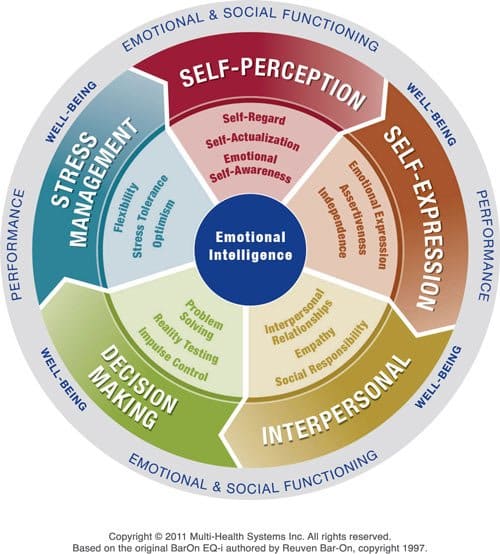
Understanding EQ-i 2.0 and the Power of Emotional Intelligence for Business Professionals
Emotional intelligence (EI) is like the secret sauce that enhances your effectiveness in both your professional and personal life. It’s about recognizing, understanding, and mastering your emotions, and it’s a critical skill for building better relationships, resolving conflicts, making informed decisions, leading effectively, and developing resilience. So, how do you go about measuring and improving your EI? That’s where the EQ-i 2.0 assessment comes into play.
What is EQ-i 2.0 and Emotional Intelligence?
The EQ-i 2.0, or the Emotional Quotient Inventory 2.0, is your tool for understanding and enhancing your emotional intelligence. Emotional intelligence itself is the ability to recognize, comprehend, and manage your emotions and the emotions of others. It’s a skill that can significantly impact your success in the business world.
EQ-i 2.0 provides you with a detailed assessment of your emotional intelligence. It evaluates your strengths and areas where there’s room for development. This valuable tool helps you gain a deep understanding of your emotional skills and how they influence your professional life.
The Impact of Emotional Intelligence
Why is emotional intelligence essential for business owners, leaders, and professionals? It’s because these competencies allow you to:
- Make better decisions.
- Communicate more clearly.
- Increase your ability to cope with stress.
- Build stronger and more connected relationships.
In fact, research shows that working on your emotional intelligence can lead to significant improvements in team productivity, reduced employee turnover, and enhanced personal happiness and satisfaction.
Measuring Emotional Intelligence
Emotional intelligence can be measured, and one of the most reliable, valid, and highly researched tools for this purpose is the EQ-i 2.0. It’s a Level B Psychometric assessment based on the research of Dr. Reuven Bar-On, published by Multi-Health Systems Inc, and can only be administered by a certified administrator.
The EQ-i 2.0 Model
The EQ-i 2.0 model breaks emotional intelligence down into fifteen competencies, grouped into five composites: Self-Perception, Self-Expression, Interpersonal, Decision Making, and Stress Management. These competencies serve as the building blocks for developing your emotional intelligence.
These competencies measure a range of skills that are crucial for success in both your personal and professional life. For example, your ability to build strong interpersonal relationships is different from your capacity to be intelligently aware of yourself. Therefore, these competencies need to be measured separately.

Assessment for EQ
There are two primary ways to assess emotional intelligence:
- EQ-i 2.0 – Self Assessment: This is a self-report tool that you complete on your own, typically taking about twenty minutes.
- EQ 360 – Multi-Rater Assessment: The EQ 360 combines your personal assessment with the perceptions of others who know you well. It requires both your self-assessment and assessments from others to provide a more comprehensive picture of your emotional intelligence.
How Does EQ-i 2.0 Work?
To complete the EQ-i 2.0 assessment, you’ll respond to 133 statements related to emotional intelligence skills. It’s a straightforward process that typically takes about twenty minutes to complete.
Once you’ve finished the assessment, the person who invited you to take the EQ-i 2.0 will create a report for you and schedule a debrief session. Note, that only a certified professional is able to provide you with an interpretation of your report and guide you where to focus on developing your EU capacity.
There are several types of reports that you can receive:
- Workplace Report: This report focuses on your performance in the workplace, emphasizing how your emotional intelligence impacts your professional life.
- Leadership Report: The Leadership Report delves into your leadership effectiveness, examining how your emotional intelligence plays a crucial role in your leadership skills.
- Higher Education Report: Designed for students to understand their emotional intelligence in order to foster academic and life success.
- Group Report: Tailored for teams and organizations, the Group Report paints the bigger picture of your team’s emotional intelligence, fostering collaboration and enhancing overall performance.


Measuring the ROI of Emotional Intelligence development
Investing in your emotional intelligence isn’t just an abstract notion. It’s a tangible return on investment that reshapes your life and career:
In the Professional Arena: Research shows that executives who focus on their emotional intelligence experience a substantial 25% increase in team productivity. This leads to improved business performance and career advancement.
Personal Enrichment: Studies reveal that individuals who nurture their emotional intelligence enjoy a remarkable 30% increase in personal happiness and satisfaction. This results in a more fulfilled and effective life.
Closing note: Developing EI is all about being more effective. Taking an EQ-i 2.0 assessment is a good start to understand the inventory of your EI competencies and how effective those skills show up for you.